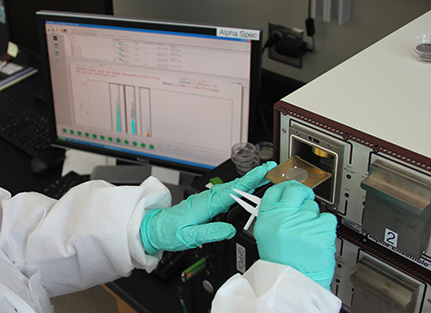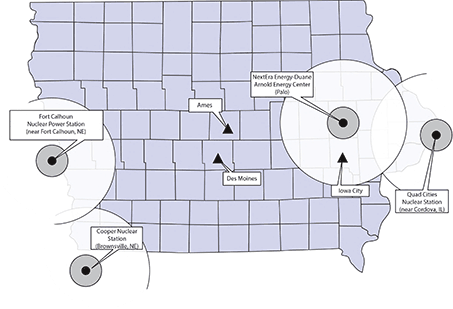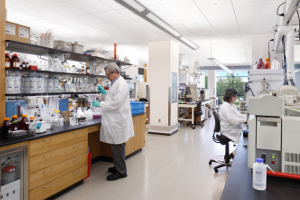Contacts:
Dustin MayEnvironmental Lab Supervisor
(319) 335-4500
dustin-may@uiowa.edu
The State Hygienic Laboratory (SHL) at the University of Iowa is home to the only certified radiochemistry laboratory in the state of Iowa.
The lab performs analysis of drinking water for naturally occurring radioactive materials for compliance with the Safe Drinking Water Act (SDWA), as well as environmental testing of water and soil, among other matrices, for research, waste disposal, and radioactive contamination.
Testing
The Hygienic laboratory offers a wide range of testing for environmental, regulatory, and research purposes. Testing for other radionuclides of interest may be arranged. Review our radiochemistry testing services or environmental test menu or contact Dustin May for information.Instrumentation
The radiochemistry laboratory is home to a variety of highly sensitive radiochemical instrumentation:
- Gas-flow Proportional Counters (GPC)
- Liquid Scintillation Counters (LSC)
- High-Purity Germanium (HPGe) Gamma Spectrophotometers
- Alpha Spectrometers
SHL also possesses a selection of handheld instrumentation that include survey meters with the ability to detect alpha, beta, and gamma radiation, as well has a handheld identifier for radioactive elements.

Emergency Response
SHL’s radiochemistry laboratory is heavily involved in responses to emergencies involving the release of radioactive materials. This could be in response to a terrorist action, such as the detonation of an improvised nuclear device (IND) or a radiological dispersal device (RDD, also called a “dirty bomb”), or in response to an accidental release from one of the five nuclear energy facilities may affect Iowa or Kansas.
SHL maintains a constant state of readiness for response to an emergency both in the laboratory and in the field, with a number of personnel trained to safely collect samples from the site of a radiological release in Iowa, as well laboratory staffed trained to respond in an emergency. SHL is also a member of the Food Emergency Response Network (FERN) as part of the Cooperative Agreement Program (CAP) with the USDA’s Food Safety and Inspection Service (FSIS). As part of this program, SHL radiochemistry provides routine screening for radionuclides in food products, special screening for major events like the Republican National Convention, and method development work specific to food matrices.

The Radiological Emergency Response Team (RERT) is part of Iowa’s Radiological Emergency Response program. This group provides field monitoring, technical consultation and initial accident assessment in coordination with the State of Iowa Department of Health and Human Services.
The team also works with Iowa Homeland Security and Emergency Management Division to prepare for the unlikely event of an act of terrorism or an accident at one of the four nuclear power plants in or near Iowa. The role of the Hygienic Laboratory’s RERT is to evaluate the extent to which radioactive materials have been released from an incident.
Federal guidelines require emergency planning for areas within a 10-mile and a 50-mile radius of a nuclear power station. The laboratory also provides the following services:
- Field surveillance and monitoring of radiation levels, including coordination of environmental sampling with state and federal agencies;
- Dose assessment in support of IDPH programs;
- Laboratory analysis and support of environmental sampling and radiological monitoring activities during an emergency and post emergency;
- Maintenance and communication of data relating to radiation exposure and contamination; and
- Technical expertise for local emergency response personnel for monitoring and decontamination of evacuees.

Outreach & Partners
Outreach- Association Public Health Laboratories: Iowa’s State Hygienic Laboratory Tackles Radioanalytical Challenges for Lead-210
- Association Public Health Laboratories: State Lab Partnerships as a Path Forward for Radiochemists?
- Environmental Health Sciences Research Center- Science Café
- ScienceFM Podcast: Environmental Radiation with Dustin May
- State Hygienic Laboratory Lab Link:
Research
Subject AreasDrinking Water, Hydraulic Fracturing, Environmental Contamination
List of Publications- May, D., Nelson, A.W., Schultz, M.K. (2017). Quantitation of Lead-210 (210Pb) Using Lead-203 (203Pb) as a “Massless” Yield Tracer. Journal of Environmental Radioactivity, 171, 93-98. DOI:10.1016/j.jenvrad.2017.02.003
- Nelson A.W., Eitrheim E.S., Knight A.W., May D., Wichman M.W, Forbes T.Z., Schultz M.K. (2017). Polonium-210 Accumulates in a Lake Receiving Coal Mine Discharges-Anthropogenic or Natural? Journal of Environmental Radioactivity, 167, 211-221. DOI:10.1016/j.jenvrad.2016.10.023
- Eitrheim, E.S., May, D., Forbes, T.Z., Nelson, A.W. (2016). Disequilibrium of Naturally Occurring Radioactive Materials (NORM) in Drill Cuttings from a Horizontal Drilling Operation. Environmental Science & Technology Letters, 3 (12), 425–429. DOI:10.1021/acs.estlett.6b00439
- Nelson A.W., May D. (2016) State Lab Partnerships as a Path Forward for Radiochemists? Bridges, 16, 7-9.
- Nelson A.W., Knight A.W., May D., Eitrheim E.S., Schultz M.K. (2015) Naturally-Occurring Radioactive Materials (NORM) Associated with Unconventional Drilling for Shale Gas. In Drogos, D.L. (Ed.), Hydraulic Fracturing: Environmental Issues (pp. 89-128). Washington DC: American Chemical Society. Chapter.
- Nelson A.W., Eitrheim E.S., Knight A.W., May D., Mehrhoff M.A., Shannon R., Litman R., Burnett W.C., Forbes T.Z., Schultz M.K. (2015) Understanding the Radioactive Ingrowth and Decay of Naturally Occurring Radioactive Materials in the Environment: An Analysis of Produced Fluids from the Marcellus Shale. Environ Health Perspectives, 123(7), 689-696.
- Nelson A.W. May D., Knight A.W., Eitrheim E.S., Mehrhoff M., Shannon R., Litman R., Schultz M.K. (2014) Matrix Complications in the Determination of Radium Levels in Hydraulic Fracturing Flowback Water from Marcellus Shale. Environmental Science & Technology Letters, 1 (3), 204–208.
- U.S. Environmental Protection Agency. Development of Rapid Radiochemical Method for Gross Alpha and Gross Beta Activity Concentration in Flowback and Produced Waters from Hydraulic Fracturing Operations. Office of Research and Development Washington DC. EPA/600/R-14/104, July 2014.
List of Collaborators
- UI researcher Dr. R. William Field, PhD to study radon and radium in Iowa groundwater and drinking water.
- UI researcher Dr. Michael Schultz, PhD on the environmental impact of hydraulic fracturing produced fluids on water quality.
Last updated Sept. 12, 2017



